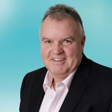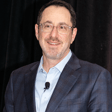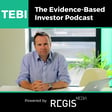Become a Creator today!Start creating today - Share your story with the world!
Start for free
00:00:00
00:00:01

Ep 17: Michael Batnick on the greatest investors’ biggest mistakes
All of us make mistakes, but, as Sir Winston Churchill once said, only the wise learn from them. What then can we learn from the mistakes of the world’s greatest investors?
That’s the question Michael Batnick asks in his new book, Big Mistakes: The Best Investors and Their Worst Moments. Even the most famous investors have dropped clangers; Warren Buffett, Bill Ackman, Jack Bogle, Ben Graham and John Maynard Keynes are among the legends whose mistakes the book analyses.
Transcript
Introduction to the Podcast and Theme
00:00:05
Speaker
Hello and welcome to the latest Tebbe podcast, brought to you by the evidence-based investor in conjunction with Regis Media, connecting advisors with clients. I'm Robin Powell. In this episode, we're looking at mistakes.
Overview of 'Big Mistakes' by Michael Batnick
00:00:22
Speaker
As Sir Winston Churchill once said, all of us make them, but only the wise learn from them.
00:00:27
Speaker
What, then, can we learn from the mistakes of the world's greatest investors? That's the question Michael Batnick asks in his new book, Big Mistakes, the Best Investors, and Their Worst Moments.
Michael Batnick's Background and Work
00:00:41
Speaker
Michael is director of research at Ritalts Wealth Management, one of America's fastest-growing financial advice businesses based in New York City.
00:00:51
Speaker
He spends most of his time developing and implementing risk management and portfolio strategies for the firm's clients. He also writes an excellent blog, The Irrelevant Investor. I've just caught up with Michael before he flies to California for evidence-based investing West, a conference which no doubt many Tebbi readers will be going to. Goodness, time flies. It only seems like yesterday that I was there for the last one.
Interview with Michael Batnick
00:01:20
Speaker
I asked Michael about the conference, about the secret to Ritalt's wealth management success and, first of all, about his book. So Michael Batnick, thank you very much for joining us and congratulations on your new book. Thank you very much and thanks for having me on.
00:01:38
Speaker
Sure. So tell me what the book is called and the idea behind it. How did you get this idea of writing about the great investors' biggest mistakes? Okay. So the name of the book is Big Mistakes, the Best Investors and the Worst Investments. And there are more books than you could possibly list on how Warren Buffett did what he did, how to make a million dollars, day trading or picking stocks or whatever the case may be.
00:02:05
Speaker
So I wanted to take the other side of that, and this is not a how not to book, but this is a book just highlighting the obvious, at least it's obvious to us, which is that investing is very difficult. It doesn't matter what you're doing, what your style is, whether you're a day trader or a long-term investor or somewhere in between, or your value or growth, it doesn't matter. And it also doesn't matter whether you're just managing your 401k or you're managing a few billion dollars. It's hard for all of us, and it never gets easier.
00:02:34
Speaker
I've seen excellent reviews of this book, Michael. And from what people are saying, it's encouraging that so many of these great investors appear to have had terrible moments, made massive mistakes. Yeah. There's no avoiding it. And mistakes are different for everybody. One person's mistake might be another person's discipline.
00:03:00
Speaker
But the point is that whatever you're doing, there's going to be bumps in the road. If you're just buying and holding forever, that's certainly difficult. Whatever you're doing, there's regret, there's tough times, but the thing that I wanted people to do is just develop a little bit of empathy for themselves today and in the future when they make mistakes.
00:03:25
Speaker
and take them in stride and really avoid the catastrophic mistakes that you can't come back from. Is there a favorite mistake that you've written about in this book? You know, possibly a mistake that we can learn more from than any other.
Lessons from Historical Investors
00:03:39
Speaker
There's so many great ones. One of the ones that I think is really interesting, and I'll choose this for you, given your accent, John Maynard Keynes basically put together the entire global financial monetary system.
00:03:53
Speaker
And he tried to read the tea leaves in the Great Depression and how do interest rates in England affect currencies in Argentina and whatever the case may be. And he got blown up in the Great Depression like so many other people did. And he did a complete 180 and became a really, really, really successful value investor, a bottom-up investor, which is pretty amazing to have that type of ability to adapt and learn from your previous mistakes.
00:04:18
Speaker
Imagine pulling your life into something and being world-renowned for macroeconomics and then going the complete other way.
00:04:26
Speaker
Seeing these mistakes and from these legends, it really ought to insert a great deal of humility into the reader. This is hard. I think people still underestimate how difficult it is not just to beat the market, but to even keep up with it. But people want to, don't they? There's this lure of kind of joining this pantheon, if you like, of great investors. Is that
00:04:51
Speaker
Possibly the main lesson to learn from this book. You're not going to be the next Warren Buffett, no matter how hard you try. So you shouldn't try. Well, you're not going to amass an 80 or whatever billion dollar fortune, whatever the number is. But the thing about the market is that the bank account or your brokerage doesn't care how you made the money.
00:05:12
Speaker
So you can and many people have gotten really lucky. So I think that's what keeps people coming back is looking for the next Amazon or the next Facebook. I mean, people have done it. There's certainly many, many success stories.
00:05:25
Speaker
And like I said, just a few seconds ago, I'm repeating myself, but it doesn't matter if you were if you were skilled or lucky. So I think that's what keeps people coming back.
Common Investor Mistakes and Strategic Planning
00:05:32
Speaker
Hope certainly springs eternal in the stock market. So we talked about the great investors, Michael, what about ordinary investors? What about, you know, the lights of you and me and the man and woman in the street, if you like, what are the most common mistakes that ordinary investors make? Well, to say the obvious, it's buying and selling at the wrong time, buying and selling for the wrong reasons, letting emotions drive the ship, not having a plan in place.
00:05:55
Speaker
I think these are all common mistakes. And I think that nobody can tell you not to day trade or not to whatever. I mean, some of these lessons, you just have to figure that I'm out on your own. So by no means am I hoping that somebody's going to read this book and then just buy and hold an index fund. But the point is whatever you choose to do, however you choose to invest, there's a lot of different ways to skin the cat. It's going to be difficult and you got to take those lessons and losses and mistakes and strut.
00:06:21
Speaker
But what are the ways of mitigating the sort of danger of making mistakes? I mean, I saw your colleague Ben Carlson blogging the other day about the importance of keeping things simple and not just for ordinary investors, but for very wealthy investors as well. Is that a good insurance scheme, if you like, against mistakes? It's hard. It's really hard. I think that if you're a more active
00:06:49
Speaker
market participant, a really good idea is to write down your thesis and write down a plan in place. I think we misremember how we felt at a certain time or why we did something. This way, you could hold yourself accountable. If you're a longer-term investor, you have to do a few things. Have a plan, a written plan, you have to have reasonable expectations, and you have to define your goals. This is not just market goals, but life goals.
00:07:14
Speaker
what are you trying to do is most people's financial goals do not include beating the S&P 500.
Financial Planning Focus at Ritholtz Wealth Management
00:07:20
Speaker
Now Mike, you work for a company called Ritholtz Wealth Management run by Barry Ritholtz based in New York City. You're no strangers to most advisors or the big advisors anyway in the US. You're probably less known about in countries like the UK. For people who haven't heard of Ritholtz, just give me a little sort of snapshot of what you're all about. Sure.
00:07:43
Speaker
One of the great things about working here is that there are a lot of different voices and we all have pretty much the same message with just a little bit of a different twist on it. And we put our truth out into the world every day and it's not for everybody but I think that our clients tend to be self-selecting because we've been doing this for so long and they basically know our philosophy. So I am not a financial planner but we have
00:08:05
Speaker
maybe a dozen on staff that actually work with the end clients, and the financial plan is the most important thing. People come to us because they're interested in our investment ideas, but that's the very, very, very last part of it. If somebody talks to us about a Sharpe ratio or a Sorrentino ratio or whatever it is, that's a glaring red flag. We prioritize getting our clients where they need to be, and where they need to be is not ahead of the S&P 500. It's answering the really big questions, the ones that matter, and that's generally, am I going to be okay?
00:08:33
Speaker
In a sense, yours is a business that's based on content. You're all brilliant writers. You know, it's no exaggeration to say, I mean, there are sort of five or six of you who probably among the top 10 bloggers in the US. So how conscious a decision has that been to if you like build this business of yours, very successful business on content? Yeah, that was an evolution. It was certainly not in the future plans, at least when I joined, it was never my
00:09:01
Speaker
my vision that one day I'm going to write a book and I'm going to have people that want to invest with me, it just sort of evolved that way. And so we're very lucky to have really good financial planners on staff that can actually work with the clients that we attract. But yeah, I mean, content is everything for us and it just sort of evolved that way. It wasn't like a grand plan.
00:09:21
Speaker
And of course, you are the company behind the evidence-based investing conferences.
Conference on Evidence-Based Investing
00:09:26
Speaker
There's now one on the East Coast and there's one on the West Coast. In fact, you're about to head off to California in the next couple of days for that. That's right. So tell me about it and how many people are coming to this latest event.
00:09:36
Speaker
So in California, there should be 600 attendees. And that's every, you know, institutional investors and retail and advisors and should be it should be really great. There's a lot of different speakers and panels, it's gonna be a lot of fun. So this whole idea of evidence based investing far much more advanced in the US than it is in other parts of the world, certainly here in in Britain. Do you feel now that there is, you know, very much a kind of momentum for change in investing?
00:10:03
Speaker
Yeah, I think evidence-based investing means different things to different people. There is certainly a change in the way that advisors work with their clients. It used to be the best stock tips and the best mutual funds, and now it's picking the best ETFs, and other advisors are just doing a goals-based planning, which is what we do. I think that the actual evidence in terms of stock selection and asset allocation, unfortunately, I think it's very limited. I think that whether you're talking about the small cap premium or the value premium or momentum or profitability, whatever you're talking about,
00:10:32
Speaker
We just have to be very careful in terms of what we can actually know about the future, which is inherently uncertain. So when I think about evidence-based investing, what I think is the evidence clearly shows that investors, generally speaking, need help, that we are our own worst enemy, that we get excited at the wrong time. I mean, nobody's immune from this. I say we, I definitely include myself in all of this.
00:10:56
Speaker
So the evidence suggests that people need help and that's what we're here to do. In terms of like the academic evidence in terms of, like I said, in terms of the CAPE ratio and all of that stuff.
00:11:07
Speaker
I'm less certain that the future will look like the past and we just have to prepare for a wide range of outcomes. I'm sensing reading your blogs and Josh Brown's posts and Barry's posts as well, that in a sense you're kind of moving this whole evidence-based investing movement on from just talking about asset pricing and efficient portfolios. You're very much now moving in the direction of improving investor behavior. Is that right?
00:11:36
Speaker
Yes, that's absolutely right. Like I said, we can't know what the future holds, so the best that we can do is shrink the gap between the expectations that our clients have and the reality that we can deliver them. Of course, we can control where the stock market goes or where the bottom market goes, but we can focus on things that we can control, which is asset allocation, which is making sure that they're taking as much risk as they need to to hit their goals, but not too much that they can't stick with their portfolio.
Tailored Investment Advice
00:12:01
Speaker
We're talking about what really matters, estate planning.
00:12:04
Speaker
what is the purpose of this money, like the things that actually matter and we're ignoring what we think doesn't. Now of course we've had a very long bull market. It presumably will end at some stage with no idea when. What would be your advice to investors at this stage in the investment cycle if you like, the economic cycle?
00:12:25
Speaker
Yeah, so at this stage in the economic cycle is one thing, but the more important thing is at what stage of the investor's life they're at, because the advice that I would give to a 30 year old, such as myself, I'm 33 years old, I'm fully invested in stocks. So that's very different advice than I would give to somebody who's 65, who is no longer generating income and can't recover from a bear market. So I think the thing that I would say is, is past behavior is a really good indicator of future behavior. So if you misbehaved in the last
00:12:53
Speaker
bear market or if you chase in this bull market, I think that you really have to know yourself as an investor. That's probably the most important thing. And then I would say, you know, we just don't know where we are in the cycle. Yes, a lot of people say we're in the late stages, but it's felt that way for a long time. In March or April of 2013, when stocks finally got above their 07 highs, the Cape ratio was higher than 90% of all other readings and people were, you know, the red lights were flashing and were up, I don't know,
00:13:22
Speaker
70% since then, I think I'm maybe making it up, but we're quite a bit since then. So you have to be just, there's limits on what we can know about the future, whether it's valuation or interest rates, or I mean, we just can't know. So I think, again, we just have to put ourselves in a position not to misbehave whether that's, you know, I think somebody has a great quote, there's two reasons why people sell stocks because they're rising and because they're falling.
00:13:46
Speaker
And I think that letting the market can just be such a distraction to what we're trying to accomplish. So that's a long-winded way of saying it's hard to give general advice to people that I don't know. Who are you most looking forward to listening to at the Evidence-Based Investing Conference then over the next few days? The person that I'm most looking forward to might not be a familiar name in England. His name is Michael Lombardi, and he was the general manager for the Cleveland Browns.
00:14:13
Speaker
And he won a he won a Super Bowl with Bell Belichick. And he has a new book coming out. And he is a very much a process oriented selector of players and personnel. And so he does it football, very similar things that we try to do with our clients. So he's a little bit outside the box, you know, not talking about smart bait or anything that might be that we've heard a million times. So this should be different. I'm really looking forward to hearing him talk. And what are you talking about briefly?
00:14:38
Speaker
So Ben and I are doing a live Animal Spirits podcast, which should be a lot of fun. Excellent. And Animal Spirits that you just explained to people who aren't aware of what Animal Spirits is. So Animal Spirits is the name of Ben Carlson of my podcast, which is a hat tip, of course, to the great John Maynard Keynes.
00:14:53
Speaker
If I could just make one observation, this is called an evidence-based investing conference. And yet, some of the speakers don't have a particularly evidence-based philosophy, if you like. And I'm thinking about the likes of Ken Fisher, for example, who has built up a very successful advice, business, and huge credit to him for that. But he's a longstanding critic, for example, of low-cost indexing.
Diverse Investing Philosophies at the Conference
00:15:20
Speaker
What would you say to people who'd question quite how evidence based some of these speakers are? Well, the evidence suggests that he has built a really fantastic asset management business. So like I said earlier, evidence means different things to different people. And there really are a million ways to skin the cat. I am pretty open minded when it comes to investing. I don't think that there's one right way to do it. Obviously, I believe very strongly in what we do. And it's right for us and for our clients, different people want different things.
00:15:49
Speaker
So who am I to say that his evidence is wrong? Michael, it's been an absolute pleasure talking to you. Thank you so much for the wisdom of your blogs and to those of your colleagues as well. Thanks for having me, Robin. I appreciate it.
Podcast Conclusion and Listener Invitation
00:16:02
Speaker
You've been listening to me, Robin Powell, talking to Michael Batnick, Director of Research at Ritalts Wealth Management. His book is called Big Mistakes, The Best Investors, and Their Worst Moments. It's published in hardcover by Bloomberg. You can find Michael's blog, by the way, at TheIrrelevantInvestor.com. That's TheIrrelevantInvestor.com.
00:16:27
Speaker
And that's it for this episode. My thanks to Michael Batnick. Thank you as well to our sponsor Regis Media. If you're a financial advisor and you want to find out how Regis Media can help you to attract, retain and educate your clients, visit the website RegisMedia.com. That's RegisMedia.com.
00:16:48
Speaker
Finally, a request. If you've enjoyed this podcast, please subscribe to it on iTunes or on SoundCloud. And if you really want to get into my good books, why not write a review on iTunes? It will only take a few minutes and you'll really be helping us to educate the end investor. Until next time, from me Robin Powell and our producer, Wahida Rahman, goodbye.
















